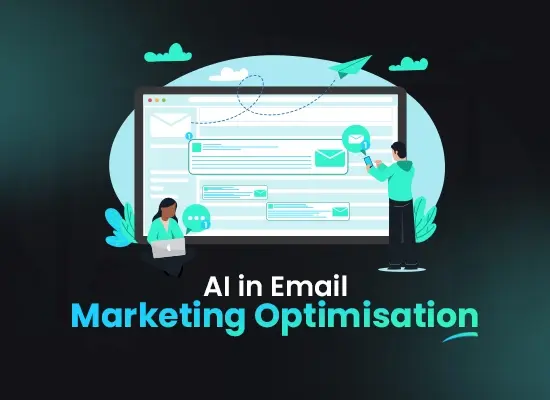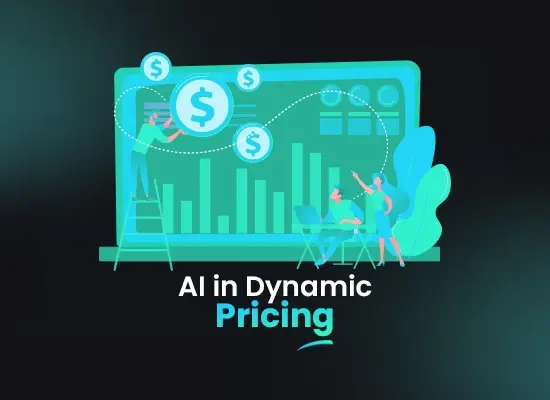AI in Supply Chain – Revolutionising Logistics by Automated Management

AI in Supply Chain
Artificial intelligence in the supply chain refers to the application of artificial intelligence technologies to enhance and optimise various aspects of the supply chain management process. This involves leveraging advanced algorithms, machine learning, and data analytics to make data-driven decisions and automate tasks within the supply chain.
What is AI in Supply Chain?
One key aspect of AI in supply chain is demand forecasting. AI algorithms analyse historical data, market trends, and external factors to predict future demand more accurately. This enables businesses to optimise inventory levels, reduce stockouts, and improve overall supply chain efficiency.
Another crucial application is in logistics and route optimisation. AI helps in planning the most efficient routes for transportation, minimising costs, and improving delivery times. This is achieved by analyzing real-time data such as traffic conditions, weather, and transportation constraints.
AI also plays a significant role in warehouse management, where it aids in optimising storage, automating order fulfilment processes, and improving overall warehouse efficiency. Robotics and automation powered by AI contribute to streamlining repetitive tasks, reducing errors, and increasing the speed of operations.
What is AI in Supply Chain Management?
AI in supply chain management refers to the integration and application of artificial intelligence technologies to enhance and optimise various aspects of the supply chain process. This includes the use of advanced algorithms, machine learning, and data analytics to streamline operations, improve decision-making, and increase overall efficiency within the supply chain.
AI in supply chain management is demand forecasting. By analysing historical data and patterns, AI algorithms can predict future demand more accurately, helping organisations optimise inventory levels and reduce excess stock or stockouts. This contributes to better resource utilisation and cost savings.
An application of AI in supply chain management is in logistics and route optimisation. AI algorithms can analyse real-time data such as traffic conditions, weather forecasts, and transportation costs to optimise delivery routes, reducing transportation time and costs. This enhances overall supply chain agility and responsiveness.
AI also plays a role in risk management by identifying potential disruptions and vulnerabilities in the supply chain. Through continuous monitoring and analysis, AI systems can help businesses proactively address issues, mitigate risks, and ensure a more resilient supply chain.
Furthermore, AI technologies contribute to improving supply chain visibility and collaboration. By providing real-time insights into the entire supply chain process, stakeholders can make informed decisions, foster better communication, and enhance overall coordination among the different parties involved in the supply chain.
Use Cases of AI in Supply Chain Management:
AI plays a crucial role in optimising various aspects of supply chain management, offering a range of benefits to businesses. One significant use case is demand forecasting, where AI algorithms analyse historical data, market trends, and external factors to predict future demand more accurately. This helps organisations optimise inventory levels and reduce the risk of stockouts or excess inventory.
Another key application is supply chain visibility and transparency. AI-powered systems can provide real-time monitoring and tracking of goods throughout the supply chain, enhancing visibility and enabling timely interventions in case of disruptions. This improves overall efficiency and helps build trust among stakeholders.
AI also facilitates route optimisation and logistics management. Algorithms can analyse vast amounts of data to determine the most efficient routes for transportation, considering factors such as traffic conditions, weather, and fuel costs. This leads to cost savings, reduced environmental impact, and improved delivery times.
In warehouse management, AI-driven technologies enhance efficiency by automating tasks such as picking, packing, and sorting. Robotics and autonomous vehicles guided by AI contribute to faster and more accurate operations, ultimately reducing labour costs and minimising errors.
Risk management is another critical area where AI is beneficial. Predictive analytics and machine learning models help identify potential risks in the supply chain, allowing businesses to proactively mitigate disruptions, whether they stem from natural disasters, geopolitical events, or other unforeseen circumstances.
Seamless Collaboration | Cost-Efficient Solutions | Faster Time-to-Market

Generative AI in Supply Chain:
Generative AI is revolutionising various industries, and the supply chain is no exception. The application of generative AI in the supply chain has the potential to transform traditional processes, enhance efficiency, and provide businesses with a competitive edge. This powerful technology involves the use of advanced algorithms to generate content, data, or even entire systems autonomously. In the context of the supply chain, generative AI development can be applied across various use cases to streamline operations, optimise decision-making, and ultimately improve overall performance.
One prominent use case of generative AI in the supply chain is demand forecasting. Traditional forecasting methods often rely on historical data and predetermined models, which may not accurately capture the dynamic and unpredictable nature of consumer behaviour. Generative AI in the supply chain, with its ability to analyse vast amounts of data and identify patterns, can significantly enhance the accuracy of demand forecasts. By processing real-time data, such as social media trends, economic indicators, and even weather patterns, generative AI in the supply chain can provide more nuanced and timely predictions, enabling companies to optimise inventory levels, reduce stockouts, and minimise excess inventory.
An application of generative AI in supply chain is predictive maintenance. In industries that heavily depend on machinery and equipment, such as manufacturing and logistics, unexpected equipment failures can lead to costly disruptions. Generative AI can be employed to analyse sensor data from these machines, identify patterns indicative of potential failures, and predict when maintenance is required. This proactive approach helps organisations schedule maintenance activities at optimal times, reducing downtime and extending the lifespan of equipment. By preventing unplanned disruptions, businesses can ensure a smoother supply chain operation and enhance overall reliability.
Supply chain optimisation is yet another compelling use case for generative AI. The complexity of modern supply chains, with numerous interconnected processes and stakeholders, presents a challenge to achieving optimal efficiency. Generative AI in supply chain can analyse various factors, including transportation costs, lead times, and supplier capabilities, to identify the most efficient routes and processes. Through iterative optimisation, these algorithms can continually refine strategies, adapting to changing market conditions and unforeseen challenges. As a result, organisations can minimise costs, enhance resource utilisation, and create more agile and responsive supply chains.
Generative AI in supply chain also plays a crucial role in risk management within the supply chain. Traditional risk management practices often involve assessing historical data and predefined risk factors, which may not adequately account for emerging risks. Generative AI in supply chain, with its ability to process vast amounts of data from diverse sources, can identify potential risks in real-time. Whether it’s geopolitical events, natural disasters, or supplier-related issues, generative AI in supply chain can analyse the impact of these factors on the supply chain and recommend proactive measures to mitigate risks. This foresight enables organisations to implement contingency plans, secure alternative suppliers, and better navigate uncertainties, thereby enhancing overall resilience.
Moreover, generative AI in supply chain can be employed for supply chain visibility and traceability. As consumers increasingly demand transparency in the sourcing and production of products, businesses are under pressure to provide accurate and real-time information about their supply chains. Generative AI in supply chain can facilitate this by analysing data from various sources, such as RFID tags, IoT devices, and blockchain technology. This enables organisations to track the movement of goods throughout the supply chain, ensuring authenticity, compliance with regulations, and ethical sourcing practices. Enhanced visibility not only meets consumer expectations but also enables companies to quickly identify and address issues such as product recalls or quality concerns.
Benefits of AI in Supply Chain:
The AI integration in supply chain management brings numerous benefits. The benefits of AI in supply chain are seen as enhancing efficiency by automating routine tasks such as demand forecasting, inventory management, and order processing. It optimises decision-making through data analysis, enabling more accurate demand predictions and resource allocation. AI-driven technologies, like machine learning and predictive analytics, mitigate risks by identifying potential disruptions and providing real-time insights. Additionally, the benefits of AI in supply chain help improve overall visibility across the supply chain, foster transparency, and enable quick responses to changing market conditions. These benefits of AI in supply chain collectively result in cost savings, improved customer satisfaction, and a more resilient and adaptive supply chain. Here are key points outlining the benefits of AI in the supply chain:
1- Enhanced Efficiency:
- AI enables automation of repetitive tasks, reducing manual efforts.
- Optimisation algorithms help streamline processes for better resource utilisation.
2- Demand Forecasting:
- AI analyses historical data and market trends to improve accuracy in demand forecasting.
- Real-time data processing aids in adapting to changes in demand patterns.
3- Inventory Management:
- AI helps optimise inventory levels by predicting demand and identifying slow-moving items.
- Prevents overstocking or stockouts, leading to cost savings and improved customer satisfaction.
4- Supply Chain Visibility:
- AI provides real-time visibility into the entire supply chain, allowing better tracking and management.
- Enables proactive decision-making based on current and accurate information.
5- Supplier Relationship Management:
- AI assesses supplier performance and risk factors, aiding in supplier selection and relationship management.
- Improves collaboration and ensures a resilient supply chain.
6- Route Optimisation:
- AI algorithms optimise transportation routes, reducing fuel consumption and transportation costs.
- Enhances delivery speed and minimises environmental impact.
7- Predictive Maintenance:
- AI-powered sensors monitor equipment health and predict maintenance needs, reducing downtime.
- Preventive actions minimise disruptions in the supply chain.
8- Quality Control:
- AI-powered technologies, such as computer vision, ensure product quality and detect defects.
- Improves overall product integrity and customer satisfaction.
9- Cost Reduction:
- Automation and optimisation lead to reduced operational costs.
- Efficient processes and better resource utilisation contribute to overall cost savings.
10- Data-driven Decision-Making:
- AI processes vast amounts of data to provide actionable insights.
- Enables strategic decision-making based on data-driven intelligence.
11- Risk Management:
- AI analyses various risk factors, such as geopolitical events or market changes, to proactively manage risks.
- Helps in developing contingency plans for potential disruptions.
12- Customer Experience:
- Improved supply chain efficiency ensures timely and accurate deliveries.
- Enhances customer satisfaction through better service and reliability.
13- Adaptability to Change:
- AI enables supply chains to adapt quickly to changes in market conditions or business requirements.
- Enhances agility and responsiveness to dynamic environments.
Seamless Collaboration | Cost-Efficient Solutions | Faster Time-to-Market

Future of AI in Supply Chain:
The future of AI in the supply chain is poised to revolutionise the way businesses manage their operations, streamline processes, and enhance overall efficiency. As we stand on the cusp of a new era characterised by technological advancements and unprecedented connectivity, AI is set to play a pivotal role in transforming traditional supply chain management into a more dynamic, responsive, and intelligent system.
One of the key aspects of the future of AI in supply chain lies in predictive analytics. AI-powered algorithms can analyse vast amounts of historical data, current market trends, and external factors to forecast demand with unprecedented accuracy. This predictive capability enables organisations to optimise inventory levels, reduce excess stock, and minimise the risk of stockouts. By leveraging AI, companies can make data-driven decisions, anticipate customer demands, and align their supply chain processes accordingly, leading to improved customer satisfaction and reduced costs.
Furthermore, the future of AI in supply chain management facilitates the creation of responsive and agile supply chains. Traditionally, supply chains were designed to be linear and reactive, often struggling to adapt to unforeseen disruptions. With AI, supply chains can become more flexible and resilient. Machine learning algorithms can continuously learn from real-time data, enabling the system to automatically adjust to changes in demand, disruptions in the supply chain, or fluctuations in market conditions. This adaptability not only enhances overall efficiency but also helps organisations navigate unforeseen challenges, such as natural disasters or global pandemics, with greater ease.
Automation is another critical aspect of the future of AI in supply chain. As technologies like robotics and autonomous vehicles continue to evolve, their integration into supply chain operations becomes more seamless. AI-driven automation can significantly enhance the efficiency of tasks such as order fulfilment, warehouse management, and transportation. For instance, autonomous drones and vehicles can optimise route planning, reduce delivery times, and cut down on labour costs. Automated warehouses equipped with robotic systems can handle inventory management, sorting, and packing with increased speed and precision. This not only accelerates the order-to-delivery cycle but also reduces the likelihood of errors, leading to improved overall reliability.
Advancing Role of Artificial Intelligence in Supply Chain:
AI’s role in enhancing visibility across the entire supply chain cannot be overstated. Real-time data analytics provided by AI enable organisations to have a comprehensive view of their supply chain processes. This visibility extends from the sourcing of raw materials to the final delivery of products to customers. By having a clear understanding of every stage in the supply chain, companies can identify bottlenecks, optimise workflows, and proactively address issues before they escalate. This heightened visibility also aids in compliance management, allowing organisations to meet regulatory requirements and adhere to ethical and sustainable practices throughout their supply chain.
Supply chain sustainability is an increasingly crucial consideration in the modern business landscape, and AI can be a powerful ally in achieving environmentally responsible practices. AI-driven analytics can assess the environmental impact of various supply chain activities and suggest alternative, eco-friendly approaches. From optimising transportation routes to minimising waste in production processes, AI can guide organisations towards more sustainable and socially responsible practices, aligning with the growing demand for environmentally conscious business operations.
The advent of blockchain technology is another facet of the future of AI in the supply chain. By integrating AI and blockchain, organisations can create a transparent, secure, and traceable supply chain ecosystem. Blockchain ensures the immutability of data, reducing the risk of fraud and enhancing the authenticity of information at every stage. AI, in turn, can leverage this trustworthy data to provide deeper insights, automate complex processes, and further enhance the efficiency of the supply chain. This synergy between AI and blockchain not only fosters trust among stakeholders but also facilitates more accurate and reliable tracking of products from source to destination.
Collaboration and connectivity are integral to the future of AI in the supply chain. The emergence of the Internet of Things (IoT) and the proliferation of interconnected devices create a wealth of data that AI systems can use for optimisation. Through seamless communication between devices, AI can facilitate the exchange of real-time information, leading to more informed decision-making. For instance, sensors in warehouses can provide data on temperature, humidity, and other environmental factors, allowing AI systems to ensure the optimal conditions for storage. Similarly, IoT-enabled devices in transportation can relay data on vehicle performance, route conditions, and delivery status, enabling AI to optimise logistics in real time.
However, with these advancements come challenges and considerations. The integration of AI in the supply chain necessitates a strategic approach to talent development. Organisations need skilled professionals who can understand and leverage AI technologies effectively. This requires ongoing training and education to bridge the skills gap and ensure that workforce capabilities align with the evolving technological landscape. Additionally, concerns related to data privacy, security, and ethical use of AI must be addressed to build and maintain trust among stakeholders.
Conclusion:
In summary, AI in the supply chain empowers businesses to make informed decisions, streamline operations, and respond dynamically to changing market conditions, ultimately leading to improved efficiency, cost savings, and customer satisfaction. AI in supply chain management harnesses advanced technologies to enhance forecasting accuracy, optimise logistics, manage risks, and improve overall visibility and collaboration, leading to a more efficient and responsive supply chain.
In addition, the use cases of AI in supply chain management span from demand forecasting and visibility to logistics optimisation, warehouse automation, and risk management. Implementing AI in these areas can lead to significant improvements in efficiency, cost-effectiveness, and overall resilience in the supply chain. The use case of generative AI in the supply chain is multifaceted and holds immense potential for revolutionising the way businesses manage their operations.
From demand forecasting and predictive maintenance to supply chain optimisation, risk management, and visibility, generative AI offers a range of applications that can drive efficiency, reduce costs, and enhance overall resilience. As technology continues to advance, businesses that embrace generative AI in their supply chain processes stand to gain a significant competitive advantage in the dynamic and complex landscape of modern commerce. Integrating AI into the supply chain brings about improvements in efficiency, accuracy, visibility, and overall adaptability, contributing to cost savings and enhanced customer satisfaction.
In conclusion, the future of AI in supply chain holds immense promise for businesses seeking to stay competitive in a rapidly evolving global landscape. From predictive analytics and automation to enhanced visibility and sustainability, AI offers a multifaceted approach to transforming supply chain management. Embracing these technological advancements requires a strategic mindset, a commitment to ongoing learning, and a focus on ethical and responsible AI implementation. As organisations navigate this transformative journey, the symbiotic relationship between AI and the supply chain is poised to redefine industry standards and pave the way for a more efficient, resilient, and sustainable future.

Author Bio
Syed Ali Hasan Shah, a content writer at Kodexo Labs with knowledge of data science, cloud computing, AI, machine learning, and cyber security. In an effort to increase awareness of AI’s potential, his engrossing and educational content clarifies technical challenges for a variety of audiences, especially business owners.






